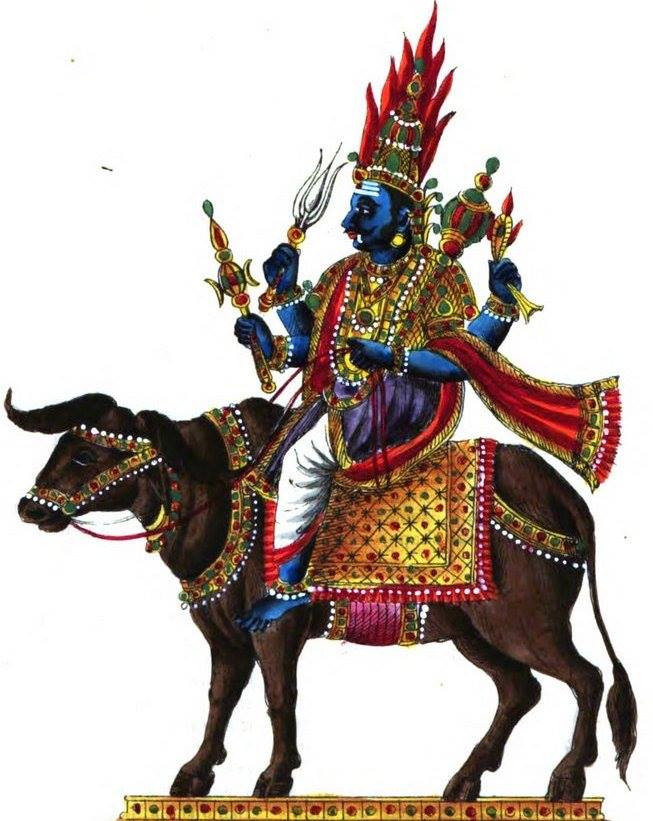Once upon a time in ancient India there lived a pious man named Vajasrawa who had a young and intellectual son named Nachiketa, there comes a day where Vajasrawa decides to do Viswajit sacrifice [one who could give up all transitory things including wealth and all his possessions in order gain knowledge of Brahman / knowledge of reality]. Hence Vajasrawa meets saints to takes advise on him performing Viswajit sacrifice and decides the ceremony date.
On the day of Viswajit sacrifice ceremony Vajasrawa decides to sacrifice few of his least valuable things, observing the ceremony Nachiketa thought “why is my father sacrificing these old cows which are of no use to anyone and felt that by giving these cows his father would not get the desired result of the sacrifice” then obediently asks his father “You are not giving away all your possessions! Dad, Am I not your possession? To whom will you give me Father?”
[wp_ad_camp_1]
At first the Vajasrawa ignored his son but Nachiketa persisted, asking him repeatedly, “To whom will you give me, father? To whom will you give me?” Vajasrawa angrily replied “I will give you to YAMA (the God of Death)” those words were unintentional, But Nachiketa decided to obey the words of his father by going to YAMA, Vajasrawa begged his son to stay back, told him his words were unintentional uttered in anger, Nachiketa with all his heart had firmly decided to obey his father, head held high with pride told his father “Our ancestors never slipped on their words and I would love to follow them, my beloved father I want you to follow the same tradition” Because Nachiketa knew that one should not fear death, the life on earth is materialistic and unreal the only path which leads to heaven[god] is path made up of truth and peace.
Vajasrawa was deeply moved but with the pride of being father to such a brave son permitted him to follow his decision, with the blessings of his father Nachiketa left to YAMALOKA [Place of Lord YAMA]. on reaching the entrance of Yamaloka, Nachiketa discovered that Lord Yama was not at home, decided to wait at the entrance and waited for three long days on the doorsteps of Yamaloka, The Lord YAMA on his return to Yamaloka saw Nachiketa waiting at the doorsteps and was deeply grieved welcomed Nachiketa to Yamaloka with all due respect. For having kept him waiting for three long days, Lord Yama granted him with three boons.
First boon: Nachiketa to lord Yama “I seek the welfare of my father as my first Boon.” Lord Yama granted him with ease.
Second boon: Nachiketa to lord Yama “I desire to know how one could reach heaven where there is no sorrow and death” lord Yama enlightened him with the details of sacrifices, performances and worships which would lead one to heaven.” Lord Yama was delighted with his request, which sounded unselfish and to the betterment of the human race, so thought Nachiketa about all the sacrifices and worship which leads you to Heaven. As Nachiketa was an intellectual and honest soul spiritually blessed could understand all that was taught hence lord Yama named the sacrifice after him.
Third boon: Nachiketa to lord Yama “When a person dies, there arises this doubt, does he still exists or not. I want you to teach me the truth.”Lord Yama was not expecting this question from a young boy. He tried to divert him but Nachiketa was very firm. He wanted to know the truth. Yama was very pleased but he tried to divert the attention with lot of attractive things. Nachiketa declined all these worldly pleasures. Yama was pleased with such a young truth-seeker who had rejected the path of enjoyment and chose the path of goodness. Then Yama taught him the knowledge of the Atman, how humans can attain immortality.
Katha Upanishad is must read for one who thinks about life, death and immortality, Katha Upanishad has two parts each containing 3 chapters.
Words of the lord of death:
“The Self cannot be known through study of the scriptures, nor through the intellect, nor through hearing learned discourses. The Self can be attained only by those whom the Self chooses. Verily unto them does the Self reveal himself.”
Author’s website: sanjaykrishne.blogspot.com













This is only one quote of Lord Yama, not very encouraging for spiritual seekers. He also explained the essence of life and death to be found in the understanding of OM. So, a spiritual life does make sense, although at the end it may look as if the Self chooses you to reveal Itself (“Divine Mercy”), but the aspirant can do all necessary preparations (living a spiritual life).
please arrange to help me read your articles in my mother language in tamil. if it possible.best regards,s.ganesan.
It appears that the story is not correct and complete. Or was there the limitation of space?
thank you this is what i wanted to read
Dear Sir,
Is this Upanishads are available in Maharashtra in Marathi luggage
Regards,
Sudhir Ingle
We like to understand in detail,can you help.
give me all details in Sanskrit
Every one must read, don’t wait until you die.
Help me read the Tamil version of upanishad if one is available.
In order to realize that we are immortal as Eswara/Atma Swarupam, We have to understand and decipher the mystery of Death. Plants and trees make food with the ingredients of Pancha Bhutamulu in the presence of sun light. Thus we draw Prana Sakti from Sun through the food we take and water we drink and air we breath and also through direct exposure to Sun. Eswara as Atma/Self and Eswari as Eswara Chaitanyam are within all of us.Self realization is realization of oneness of Eswara and Eswari that is SivaSaktaikyam.
Eswari as Eswara sakti within us is in three forms as Icchha Sakti ,Jnana Sakti and Kriya Sakti. Due to the power of Icchha Sakti , the energy derived from the food taken by us is divided in to five types of Prana Sakti and these five types of Prana Sakti energize Pancha Pranamulu which empower Pancha Jnana Indriyamulu and make the body functional. Apart from these five types of Prana Sakti, an additional subtle part is also formed at the time of division and this part feeds mind and activates it to run after the worldly pleasures by employing the five sense organs which act as interfaces while experiencing the worldly pleasures little . Thus the Prana Sakti derived from food escapes out in to the world. One hardly realizes that the sensual pleasures are quite temporary and end up with misery and frustration.
A spiritual seeker who is in the pursuit of the everlasting happiness(Paripoorna Anandam) develops dispassion towards the sensual pleasures and withdraws the sixth subtle part and integrates with the Icchha Sakti and this Sakti transforms in to quest for Absolute knowledge(Knowledge of Atman) and accordingly the spiritual seeker approaches SatGuru and bows down to him. Having thus acquired Jnana Sakti from SatGuru, the spiritual seeker starts observing spiritual practices which include restricted diet , sleep and restricted indulgence in worldly thoughts and deeds. and undertakes the most important activity that is meditation(Dhyanam) on Eswaral. On acquiring Laya Sakti(implementation power)the seeker he would unite all the three types of energy and thereby the seeker would integrate the individual consciousness with the Absolute consciousness and would undergo Eswara Vibhuti(spiritual enlightenment)
Now when the Energy derived from the food taken from out side is only divided in to five types of Prana Sakti due to the power of Eswara Sakti and the additional sixth subtle part which feeds mind is not produced, the five types of Prana Sakti within the body escape out into Prapancham and death occurs.